#worldbuilding help
Text
Fantasy Guide to Building A Culture

Culture is defined by a collection of morals, ethics, traditions, customs and behaviours shared by a group of people.
Hierarchy and Social Structures

Within every culture, there is a hierarchy. Hierarchies are an important part of any culture, usually do ingrained that one within the culture wouldn't even question it. Hierarchy can be established either by age, gender or wealth and could even determine roles within their society. Sometimes hierarchy can may be oppressive and rigid whilst other times, ranks can intermingle without trouble. You should consider how these different ranks interact with one another and whether there are any special gestures or acts of deference one must pay to those higher than them. For example, the Khasi people of Meghalaya (Northern India), are strictly matrillineal. Women run the households, inheritance runs through the female line, and the men of the culture typically defer to their mothers and wives. Here are a few questions to consider:
How is a leader determined within the culture as a whole and the family unit?
Is the culture matriarchal? Patriarchal? Or does gender even matter?
How would one recognise the different ranks?
How would one act around somebody higher ranking? How would somebody he expected to act around somebody lower ranking?
Can one move socially? If not, why? If so, how?
Traditions and Customs

Traditions are a staple in any culture. These can be gestures or living life a certain way or to the way a certain person should look. Traditions are a personal detail to culture, they are what make it important. Tradition can dictate how one should keep their home, run their family, take care of their appearance, act in public and even determine relationship. Tradition can also be a double edged sword. Traditions can also be restrictive and allow a culture to push away a former member if they do not adhere to them, eg Traditional expectations of chastity led to thousands of Irish women being imprisoned at the Magdelene Laundries. Customs could be anything from how one treats another, to how they greet someone.
How important is tradition?
What are some rituals your culture undertakes?
What are some traditional values in your world? Does it effect daily life?
Are there any traditions that determine one's status?
Values and Opinions
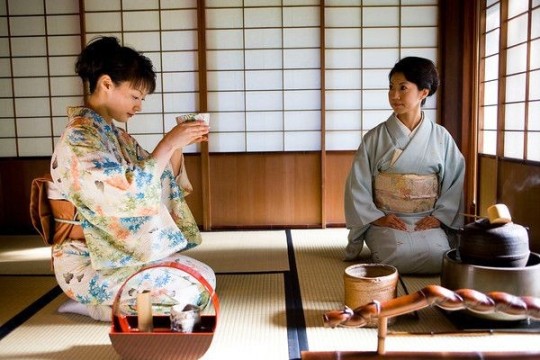
Values and Opinions are the bread and butter of any culture. This is the way your culture sees the world and how they approach different life hurdles. These may differ with other cultures and be considered odd to outsiders, what one culture may value another may not and what opinion another holds, one may not. There will be historical and traditional reasons to why these values and opinions are held. Cultures usually have a paragon to which they hold their members to, a list of characteristics that they expect one to if not adhere to then aspire to. The Yoruba people value honesty, hard work, courage and integrity. Here are some questions to consider?
How important are these ethics and core values? Could somebody be ostracised for not living up to them?
What are some morals that clash with other cultures?
What does your culture precieved to be right? Or wrong?
What are some opinions that are considered to be taboo in your culture? Why?
Dress Code

For many cultures, the way somebody dresses can be important. History and ethics can effect how one is meant to be dressed such as an expectation of chastity, can impose strict modesty. While other cultures, put more importance on details, the different sorts of clothes worn and when or what colour one might wear. The Palestinian people (من النهر إلى البحر ، قد يكونون أحرارا) denoted different family ties, marriage status and wealth by the embroidery and detailing on their thoub.
Are there traditional clothes for your world? Are they something somebody wears on a daily basis or just on occasion?
Are there any rules around what people can wear?
What would be considered formal dress? Casual dress?
What would happen if somebody wore the wrong clothes to an event?
Language

Language can also be ingrained as part of a Culture. It can be a specific way one speaks or a an entirely different language. For example, in the Southern States of America, one can engage in a sort of double talk, saying something that sounds sweet whilst delivering something pointed. Bless their heart. I have a post on creating your own language here.
Arts, Music and Craft

Many cultures are known for different styles of dance, their artwork and crafts. Art is a great part of culture, a way for people to express themselves and their culture in art form. Dance can be an integral part of culture, such as céilí dance in Ireland or the Polka in the Czech Republic. Handicrafts could also be important in culture, such as knitting in Scottish culture and Hebron glass in Palestine. Music is also close to culture, from traditional kinds of singing such as the White Voice in Ukraine and the playing of certain instruments such as the mvet.
Food and Diet

The way a culture prepares or intakes or treats certain foods are important to a culture. In some cultures, there is a diet yo adhere to, certain foods are completely banned. With Jewish culture, pork is prohibited along with fish such as sturgeon, along with shellfish and certain fowl. Meat must also be prepared in a certain way and animal byproducts such as dairy, must never be created or even eaten around this meat. This is known as kosher. The way one consumes food is also important to culture. In some cultures, only certain people may eat together. Some cultures place important on how food is eaten. In Nigerian culture, the oldest guests are served first usually the men before the women. In Japanese culture, one must say 'itadakimasu' (I recieve) before eating. Culture may also include fasting, periods of time one doesn't intake food for a specific reason.
What are some traditional dishes in your world?
What would be a basic diet for the common man?
What's considered a delicacy?
Is there a societal difference in diet? What are the factors that effect diet between classes?
Is there any influence from other cuisines? If not, why not? If so, to what extent?
What would a typical breakfast contain?
What meals are served during the day?
What's considered a comfort food or drink?
Are there any restrictions on who can eat what or when?
Are there any banned foods?
What stance does your world take on alcohol? Is it legal? Can anybody consume it?
Are there any dining customs? Are traditions?
Is there a difference in formal meals or casual meals? If so, what's involved?
Are there any gestures or actions unacceptable at the dinner table?
How are guests treated at meals? If they are given deference, how so?
#Fantasy Guide to Building A Culture#As promised#If I fail my German exam I'm blaming ye#Culture#Building a culture#Fantasy Guide#WorldBuilding#WorldBuilding guide#WorldBuilding help#Writing help#writing#writeblr#writing resources#writing reference#writing advice#ask answered questions#writers#writing advice writing resources#spilled ink#ask answered
8K notes
·
View notes
Text
I remember this one post that was pretty popular that I can't find now. It was a post about how nature in worldbuilding could be more diverse. Like, instead of just forests, it talked about painted deserts, taiga forests, tundras, and a bunch of others. I can't remember much else besides it being a long photo post, but any info about it would be appreciated!
19 notes
·
View notes
Text
does anyone else writing fantasy have preferred templates/question lists for fleshing out the rules of a magic system? I've got a drug-induced vision and 3 pages of incoherent bullet notes.
11 notes
·
View notes
Text
https://www.fiverr.com/s2/d5fa07572b
https://www.fiverr.com/s2/4cba22d7ea
https://www.fiverr.com/s2/a965e31780

#the 'ill read your fsnfic and leave a nice comment' one is a joke for the record fkshsjsk#like you can get it if you want and ill do the thing but i did make it as a joke#also the prices were supposed to be like. 2 dollars for that one#but you can pnly put multiples of five? for some reason?#not redacted asmr#freelancer#worldbuilding#dumb stuff#worldbuilding help#fiverr
9 notes
·
View notes
Link
i despise organizing my notes so i made a worldbuilding worksheet :]
2 notes
·
View notes
Text
I Need Worldbuilding Help!
SUBJECT: Temperature, Time, Planetary Tilt
I’m finally deciding to be semi-active in my worldbuilding again, but I need to decide on a time and planetary system for my fantasy world. It’s been around 35,000 years since a world-ending event that almost rendered all sentient life extinct, but many groups managed to rise from the ashes thousands of years later in order to rebuild and live a life on the surface. I have the current year temporarily set to 35219, but I genuinely don’t like that quintuple-digit system and would rather forgo it for something better.
I already have a basis for yearly timing, with 14 months being in a year in contrast to 12, so I’d need to work around that and find out how I’m going to adjust my days, hours, weeks, etc.. From my limited knowledge, I’d assume that the planet turns slower on both the local and solar level. I also have a warmer south pole and a slightly colder north pole, so I’d assume that the planet is permanently tilted slightly to one side. Are my assumptions correct? Furthermore, how would I go about further structuring my time system, and how would I more accurately build the system I have in place? In temperature equivalency, the planet’s south pole would have a similar temperature to the Tropic of Capricorn for example at 30°C (86°F) whilst the north would hypothetically have temperatures equivalent to the real North Pole inbetween Summer and Winter (approx. -30°C, -28°F). Again, are my assumptions here correct as well? What would you suggest for improvement?
1 note
·
View note
Text
i think i butchered worldbuilding so bad like the continents are so big and the names are so bad
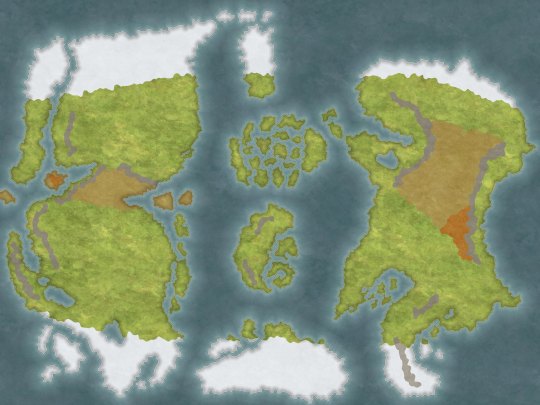
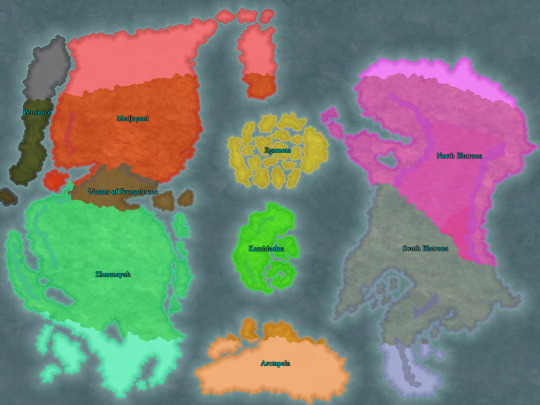
like i didnt do any continent shelf stuff and i feel like the names of the continents and the world (oneirus) are too blatant and/or obvious
also, any good world map websites?
1 note
·
View note
Text
Introductions
Hello! I'm the little gremlin in your head that whispers "does this one-shot fanfic have enough political intrigue?" Nice to finally meet you, blog-to-blog.
on this blog, I will be sharing my thoughts, tips, and pointers for worldbuilding and very specific subjects that might pop up in your writing journey.
Remember: Worldbuilding is subjective. What might work for one story might not work for another and there's an audience of everything. Follow what you want, don't follow what doesn't gel, and do what makes you happy. <3
#worldbuilding#lntroductions#writing advice#writing advice blog#worldbuilding ideas#worldbuilding help
0 notes
Text
Oooh you cannot IMAGINE the rage I feel when someone tries to create a guide that gives no creativity but NARROWS creativity down. Basically saying things like "This is the only right way", "By doing this you create the perfect world" and so on.
Mojito, riddle me this. Do you try to teach people how to be you, or do you try to teach people how to be themselves? Because saying that the way you do things is the only right one is not right, even if it's pretty dense on information and well written, there is no one railroad of "correct worldbuilding".
The only criteria I think can be regarded as "correct worldbuilding" is in-universe consistency. And even it can be fiddled with via time travel and godly powers in-universe.
0 notes
Text
Let's talk about worldbuilding.
Worldbuilding is a crucial aspect of writing fiction, particularly in genres like fantasy and science fiction.
Remember that worldbuilding is a dynamic process that evolves as you write. Don't be afraid to experiment and make changes to your world as needed to serve the story.
Here are some tips to help you build a rich and immersive world:
Start with a Core Concept: Every world begins with an idea. Whether it's a magic system, a futuristic society, or an alternate history, have a clear concept that serves as the foundation for your world.
Define the Rules: Establish the rules that govern your world, including its physical laws, magic systems, societal norms, and cultural practices. Consistency is key to creating a believable world.
Create a Detailed Map: Optional, but helpful. Develop a map of your world to visualise its geography, including continents, countries, cities, and landmarks. Consider factors like climate, terrain, and natural resources to make your world feel authentic.
Build a History: Develop a rich history for your world, including key events, conflicts, and historical figures. Consider how past events have shaped the present and influenced the cultures and societies within your world.
Develop Cultures and Societies: Create diverse cultures and societies within your world, each with its own beliefs, traditions, languages, and social structures. Explore how different cultures interact and conflict with one another.
Flesh Out Characters: Populate your world with memorable characters who reflect its diversity and complexity. Consider how their backgrounds, motivations, and personalities are shaped by the world around them. (See my post on character development for more!)
Consider Technology and Magic: Determine the level of technology and the presence of magic in your world, and how they impact daily life, society, and the overall narrative.
Think about Economics and Politics: Consider the economic systems, political structures, and power dynamics within your world. Explore issues like inequality, governance, and social justice to add depth to your worldbuilding.
Show, Don't Tell: Instead of dumping information on readers, reveal details about your world gradually through storytelling. Show how characters interact with their environment and incorporate worldbuilding seamlessly into the narrative.
Stay Consistent: Maintain consistency in your worldbuilding to ensure coherence and believability. Keep track of details like character names, historical events, and geographic locations to avoid contradictions.
Leave Room for Exploration: While it's essential to have a solid foundation for your world, leave room for discovery and exploration as you write. Allow your world to evolve organically and be open to new ideas and possibilities.
Revise and Edit: Carefully review your worldbuilding to identify any inconsistencies, plot holes, or contradictory elements. Pay attention to details such as character backgrounds, historical events, and the rules of your world's magic or technology. Make necessary revisions to resolve any issues and maintain the integrity of your worldbuilding.
Happy writing!
#writeblr#writing#writing tips#writing help#writing resources#writing advice#worldbuilding#fantasy worldbuilding#creative writing
635 notes
·
View notes
Text
I'm in A Mood™ (stressed) so im going back to my roots of melting two character together into one person. So bruce wayne!danny fenton. Danny Fenton who, for eight years, grew up in a beautiful gothic manor with his mom and dad under the name "Bruce Wayne". Playing piano with his mother, running around the manor with his father.
Then when he's eight it's ripped away from him. There's blood on his hands and pearls pooling at his feet, and both his parents are dead in front of him.
And he gets shipped off to distant relatives "the Fentons" shortly after, Alfred close on his heels because someone needs to take care of him, someone that knows him. Bruce goes to the Fentons for the safety of anonymity. Gotham's press wants to sink its teeth into him.
Danny misses his city even if it took everything from him. There are shadows in his eyes and he's pale as a sheet even beside his distant cousins, and they change his name to "Danny Fenton' because nobody should know that their newest child was illustrious orphan Bruce Wayne.
They call him Bruce behind closed doors. Danny prefers it that way, he clings onto the name -- the one his parents gave him -- like a lifeline. He makes friends with Sam and Tucker. Tucker takes one look at the willowy, morbid little boy standing in the corner like a shade, ghosts in his eyes, and drags him out into the sunlight, and takes him over to Sam.
When Danny is twelve, he's still not over it -- and he's a little obsessed with the Fentons' research, with the morbid. He has books upon books on death, murder, detective work. Anything he can get his hands on. And stars. He loves stars.
Alfred owns the apartment next to them and comes over regularly. Danny clings to him.
When Danny is twelve, he's still quiet, meek, a shy little thing prone to being bullied. Freaky little Fenton with the night in his eyes and too-cold skin even before he put one foot in the grave. in a sleepover in his room with Sam and Tucker, he tells them the truth. They're his friends, he trusts them.
"My name is Bruce." he murmurs, voice quiet as the breeze, always quiet. he's staring at his star-covered sheets.
"Like Bruce Wayne?" Tucker asks, a joking tone in his voice.
Danny smiles a little, lamb-like with insecurity. "I am Bruce Wayne." And he takes them down to the lab, disrupting Maddie and Jack, to prove it. Sam tells them of her own wealth then shortly after. They start calling Danny "Bruce" in private too -- its trust. Thats what it is. It's trust.
Sam goes to media functions and comes back with aching feet and complaints on her tongue -- and Danny soaks it up all like a sponge, splayed across a beanbag chair with Tucker in her room. He's not envious of her, he used to go to events with his parents and they kept him safe from the ugly of Gotham's Elite. For the most part. He's had comments made at him, he doesn't miss them.
Alfred returns to the manor semi-regularly, Danny goes with him. he wanders the hallways and helps Alfred clean, the last thing either of them want is for their home to fall into disrepair. He brings Jazz with him next time, then Tucker, then Sam. They all help him clean, and he shows them his room. The one across from his parents', it feels strange.
When Danny dies when he's fourteen, the first adult he tells is Alfred. He and Jazz go over to his house more often than they stay in the Fentonworks building. At least at Alfred's, the food doesn't come to life. Alfred sits at the kitchen table and weeps when Danny tells him, Jazz is upstairs, and its just the two of them.
Danny's ghost form wears pearls around his wrist and the gloves look stained with some kind of black substance. He looks like a child who died in a lab accident, but he also looks like a child who has shadows dripping off his shoulders, curling at his feet, hanging from his eyes.
because amorphous blob batman has my heart always and danny/bruce will not escape it even in death even if that IS the only reason im giving him Mild BatBlob Vibes...so far
when they go to the manor, alfred helps danny make a pile of stones between Martha and Thomas' graves, nobody but the two of them (and sam and tucker) will know what it means. (not even bruce's children later down the line, not for a long, long time)
danny dives into ghost fighting on shaky feet and not half as witty as he once was in one world. he's skittish, skittering between blasts from shadow to shadow and clumsily making his way through each battle. but helping people lights a fire in him. he still has shadows dripping off his feet but there's a purpose in his eyes.
and god help him, he's going to help people.
#dpxdc#dp x dc#danny fenton is not the ghost king#dp x dc crossover#dpxdc crossover#dpdc#dpxdc prompt#this is just me torturing danny for a little bit because im stressed and i cried for an hour while i was driving so im taking it out on B#thanks for being my little stress ball danny#aha my old middle school habit of frankensteining two characters together is resurfacing again :) yall should've seen my wattpad drafts#in middle school. i had 50 of them and most of them were me combining two characters together to make one person and putting them in one au#my most memorable being skydoesminecraft and harry potter. THAT was a fun worldbuilding experience#do i think that growing up with the fentons would fix bruce/danny completely?? hurm. no. dont kid yallselves jazz is not a licensed#therapist not even at like. nine when she meets danny. she's not helping him through his trauma in the slightest. she's nagging.#she's his sister or sister-like figure before she's his therapist. would he be#*entirely* like canon bruce tho?? no. dannybruce is a mix of the both of them. but this is still the first post of the au and is more so#just me doing the equivalent of popping a stress ball so nothing is smoothed over. mostly im just trying to keep bruce's trauma prominent i#danny's character because he IS Bruce. i dont want him to just be 'danny with bruce's backstory but without any of the ugly bits'.#danny and bruce is used interchangeably because they're the same person but sorry if his personality feels imbalanced i came up with this o#the spot. was going to type more but the stress has left me. for now. watch ur back danny 👀
440 notes
·
View notes
Text
i wanted to send people asks about their wips and ocs more often. not only to promote them but also because everyone makes really cool stories. the sheer amount of detail and work that people put into their projects is amazing but often gets untold. and i wanted to start learning about them and trying to promote it to the best of my ability.
i sent out a bunch of asks yesterday and i want to do more. i dont want to intrude or be weird though so i wanted to get a list of people who would like asks.
reblog this if you would like to recieve asks about your wips/ocs a couple times throughout the week.
or you can comment to be put on the list.
CLOSED AS OF 8/16 8:30AM. any more requests/reblogs will be appreciated but ignored.
#writing#writeblr#ask game#writing help#fiction writing#creative writing#oc development#worldbuilding#wip#writers of tumblr#writersociety#worldbuilding questions#oc questions#writing prompt#writing support#author
870 notes
·
View notes
Text
25 ɦσƭ ƭɦเɳɠร σɳℓყ ɦσƭ ૮ɦα૨α૮ƭε૨ร ∂σ
[Title Reads: 25 Hot Things Only Hot Characters Do]
Rolling up their sleeves
Pulling clothing off of themselves or other characters with a single hand
Using nicknames
Protecting other characters from harm even when they know they'll get hurt
Holding Character A's chin, thigh, or back
Never sharing personal secrets with others
Lip biting
Staying behind Character A with their arms wrapped around their waist or turning them around
Kissing them indirectly with a piece of paper/hand/mask in between their lips
Softly rubbing a spot on Character A's body that hurts
Tucking, brushing, braiding, and patting Character A's hair
Catching other characters giving Character A a dirty glare and then Character B does it back at them
Being above Character A as the other is kneeling before them
Remembering key details about other characters like what they like, how they interact, their reactions...
Feeding Character A and then eating from the same spoon or drinking from the same cup at the exact location where A's lips were
Reminding their friends they care about them
Becoming what they need to be in certain circumstances
Putting Character A's head onto their lap
Catching A when they fall
Winking, nudging with an elbow, playful surprises
Telling the truth even when it hurts
Teasing Character A for almost everything and then pushing them against the wall with their lips pressed together
Eagerly waiting for Character A to appear
Grabbing Character A's chair and pulling them closer
Not just being a cold-hearted person and developing empathy for others
~~~
MASTERLIST
#writing prompt#imagine your otp#pining prompts#enemies to lovers#cute prompts#character features#writing help#writing tips#writing inspiration#writing#writing ideas#worldbuilding#otp#otp prompts#otp scenarios
1K notes
·
View notes
Text
A writer’s guide to the historical method: how historians work with sources
In this post, I provide a brief overview of how historians engage with different types of sources, with a focus on the mindset of a historian. This insight could be valuable for anyone crafting a character whose profession revolves around history research. It may also prove useful for authors conducting research for their book.
Concept of historical source
The concept of historical source evolves over time.
Initially, the focus was mainly on written sources due to their obvious availability. However, as time has progressed, historians now consider a wide range of sources beyond just written records. These include material artifacts, intangible cultural elements, and even virtual data.
While "armchair historians" may rely on existing studies and secondary sources, true professional historians distinguish themselves by delving directly into primary sources. They engage in a nuanced examination of various sources, weaving together diverse perspectives. It's crucial to recognize the distinction between personal recollection or memory and the rigorous discipline of historical inquiry. A historical source provides information, but the truth must be carefully discerned through critical analysis and corroboration.
Here's a concise list of the types of sources historians utilize:
Notarial source
Epistolary source
Accountancy source
Epigraphic source
Chronicle source
Oratory and oral source
Iconographic source
Diary source
Electronic source
Example: a notarial source
These are documents drafted by a notary, a public official entrusted with providing legal certainty to facts and legal transactions. These documents can take various forms, such as deeds, lawsuits, wills, contracts, powers of attorney, inventories, and many others.
Here we are specifically discussing a lawsuit document from 1211 in Italy.
A medieval lawsuit document is highly valuable for understanding various aspects of daily life because in a dispute, one must argue a position. From lawsuits, we also understand how institutions truly operated.
Furthermore, in the Middle Ages, lawsuits mostly relied on witnesses as evidence, so we can access a direct and popular source of certain specific social situations.
Some insight into the methodology of analysis:
Formal examination: historians scrutinize the document's form, verifying its authenticity and integrity. Elements such as structure, writing style, language, signatures, and seals are analyzed. Indeed, a professional historian will rarely conduct research on a source published in a volume but will instead go directly to the archive to study its origin, to avoid transcription errors.
Content analysis: historians proceed to analyze the document's content, extracting useful information for their research. This may include data on individuals, places, events, economic activities, social relations, and much more. It's crucial to compile a list of witnesses in a case and identify them to understand why they speak or why they speak in a certain manner.
Cross-referencing with other sources: information derived from the notarial source is compared with that of other historical sources to obtain a more comprehensive and accurate view of the period under examination.
Documents of the episcopal archive of Ivrea
Let's take the example of a specific legal case, stemming from the documents of the episcopal archive of Ivrea. It's a case from 1211 in Italy involving the bishop of Ivrea in dispute with Bongiovanni d'Albiano over feudal obligations.
This case is significant because it allows us to understand how feudal society operated and how social status was determined.
The bishop's representative argues that Bongiovanni should provide a horse as a feudal service. Bongiovanni denies it, claiming to be a noble, not a serf. Both parties present witnesses and documents supporting their arguments.
Witnesses are asked whether the serf obligations had been endured for a long time. This helps us understand that in a society where "law" was based on customs, it was important to ascertain if an obligation had been endured for a long time because at that point it would no longer be contestable (it would have become customary).
The responses are confused and inconsistent, so witnesses are directly asked whether they consider Bongiovanni a serf or a noble. This is because (and it allows us to understand that) the division into "social classes" wasn't definable within concrete boundaries; it was more about the appearance of one's way of life. If a serf refused to fulfill his serf duties, he would easily be considered a noble by bystanders because he lived like one.
Ultimately, the analysis of the case leads us to determine that medieval justice wasn't conceived with the logic of our modern system, but was measured in oaths and witnesses as evidentiary means. And emerging from it with honor was much more important than fairly distributing blame and reason.
Other sources
Accounting source: it is very useful for measuring consumption and its variety in a particular historical period. To reconstruct past consumption, inventories post mortem are often used, which are lists of goods found in households, described and valued by notaries to facilitate distribution among heirs.
Alternatively, the recording of daily expenses, which in modern times were often very detailed, can lead to insights into complex family histories and their internal inequalities - for example, more money might be spent on one child than another corresponding to their planned future role in society.
Oral source: in relation to the political sphere, it is useful for representing that part of politics composed of direct sources, that is, where politics speaks of itself and how it presents itself to the public, such as a politician's public speech.
However, working with this type of source, a historian cannot avoid hermeneutic work, as through the speech, the politician aims to present himself to a certain audience, justify, persuade, construct his own image, and achieve results. This is the hidden agenda that also exists in the most obvious part of politics.
Iconographic source: it concerns art or other forms of "artistic" expression, such as in the case of an advertising poster. They become historical sources when it is the historian who, through analysis, confers upon them the status of a historical source. Essentially, the historian uses the source to understand aspects of the past otherwise inaccessible.
The first step in this direction is to recontextualize the source, returning it to its original context. Examining the history of the source represents the fundamental first step for historical analysis.
Diary source: diaries are a "subjective" source, a representation of one's self, often influenced by the thoughts of "others," who can be close or distant readers, interested or distracted, visible or invisible, whom every diary author can imagine and hope to see, sooner or later, reflected on the pages of their writing.
Furthermore, they are often subject to subsequent manipulations, and therefore should be treated by historians only in their critical edition; all other versions, whether old or new, foreign or not, are useful only as evidence of the changes and manipulations undergone over time by the original manuscripts.
Electronic source: historians use Wikipedia even if they often don't admit it out loud.
This blog is supported through tips here on Tumblr. If you’d like to support me, please consider giving a tip.
#writing advice#writing help#writing reference#writing tips#creative writing#fantasy worldbuilding#fantasy writing#worldbuilding#worldbuilding tips
296 notes
·
View notes
Text
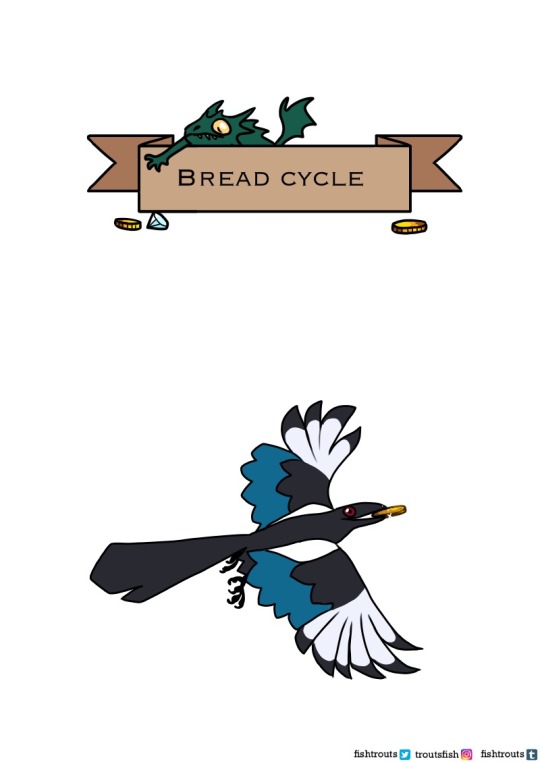
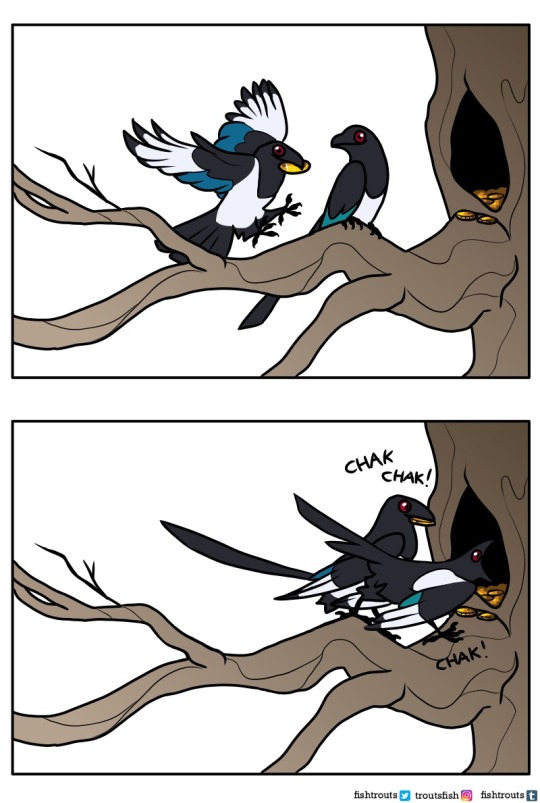
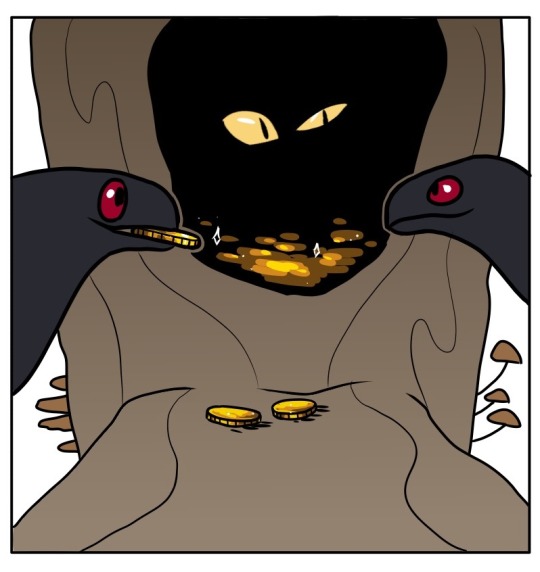


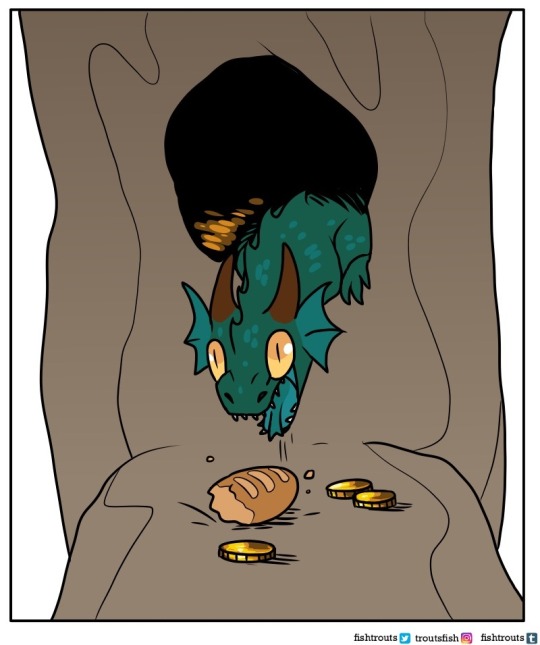
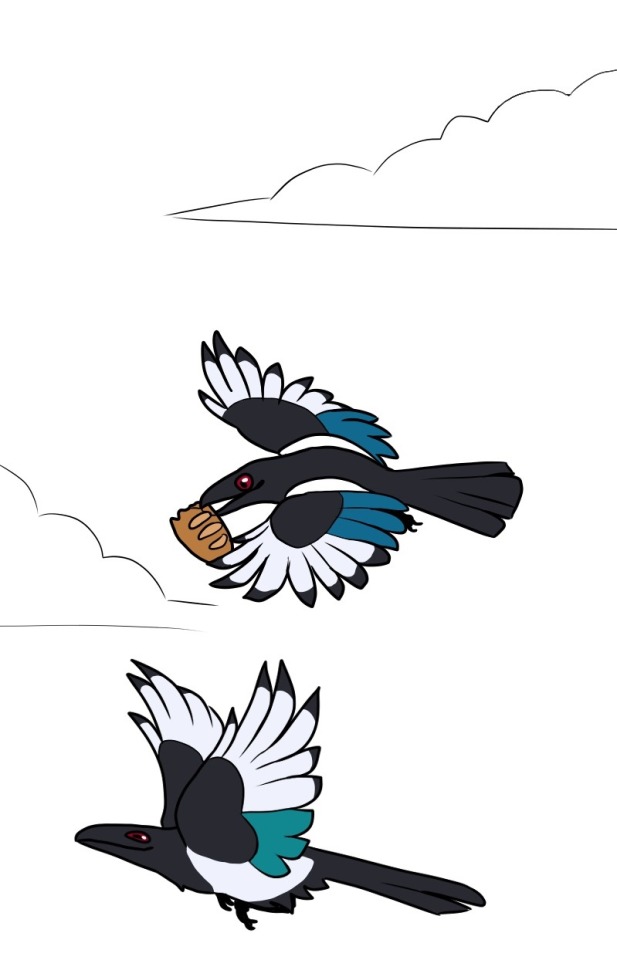
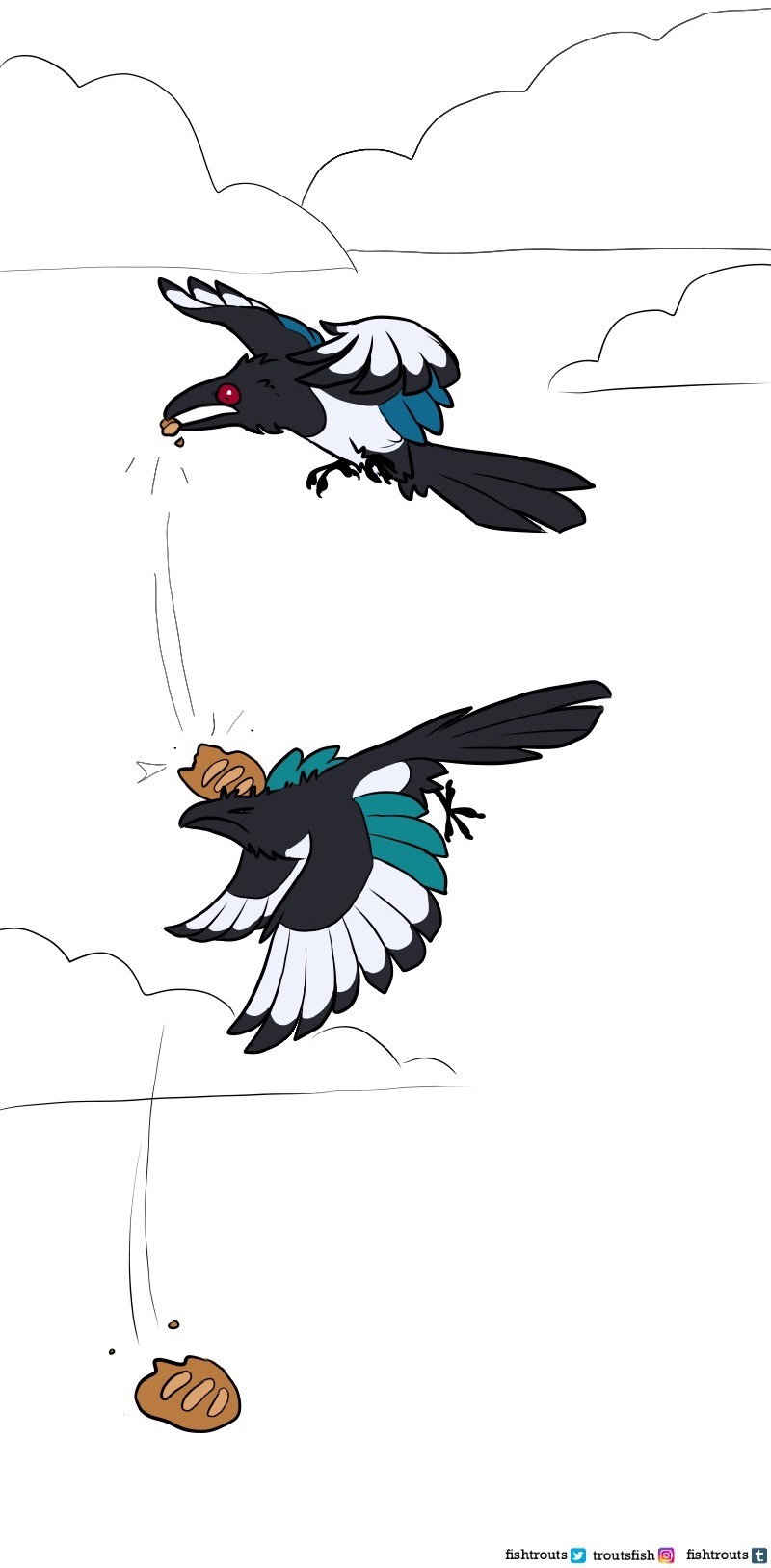
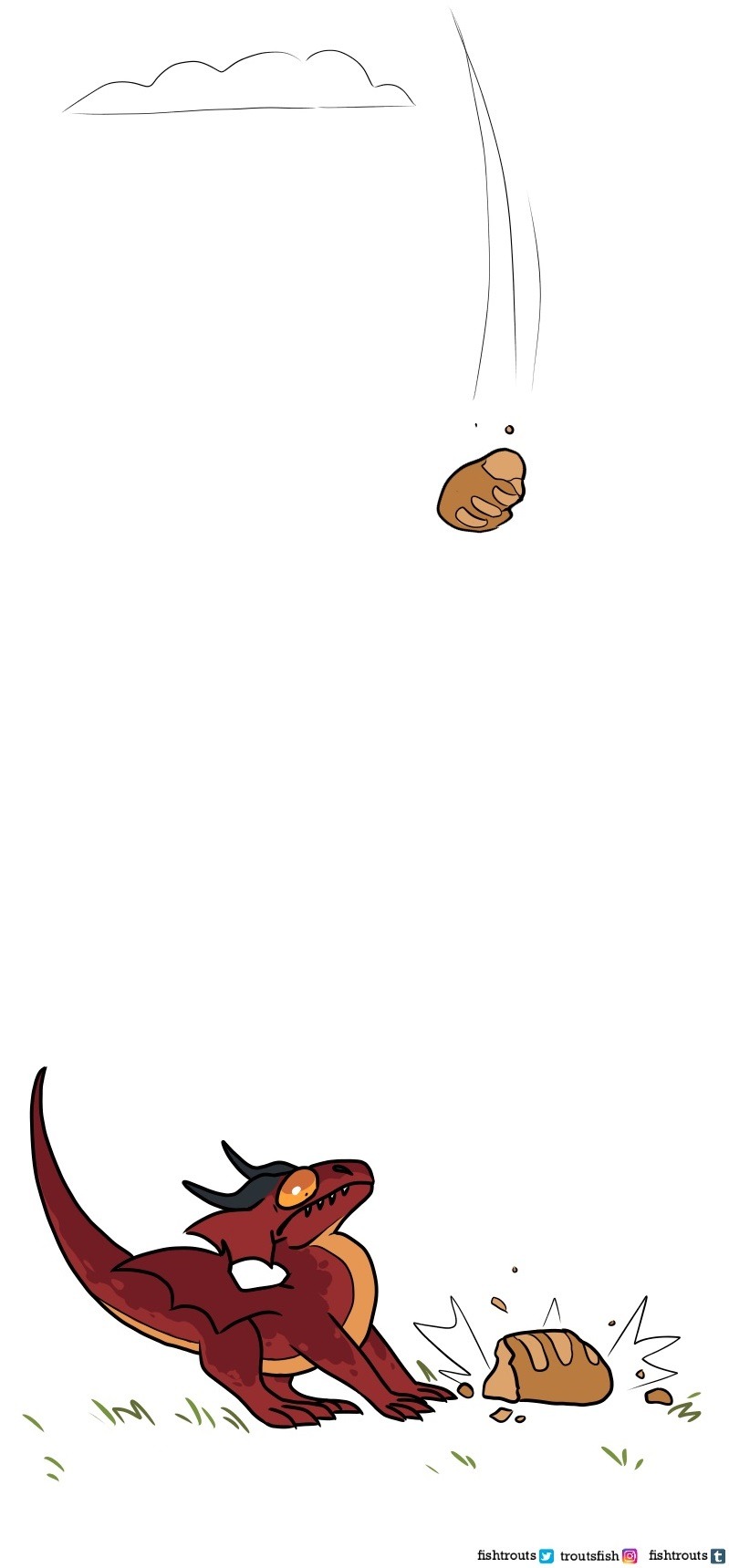
Small dragon species and corvids occasionally engage in trade with each other. Magpies have learned that dragons desire gold more than anything, and so they can fetch a hefty price for it!
~~~
A somewhat part 2 to the tragic baguette story. You were all so sad the red dragon didn’t get his bread, so..
Support me on Patreon! I post comics there first, along with some exclusive ones and other art :)
#comic#dragon#dragons#digital art#comics#dragon art#magpie#corvid#corvids#magpies#art#why is the quality so awful??#I'm trying to fix it#Cropping the images into smaller segments really doesn't help#ahhhh#worldbuilding#this could be a nice dnd idea
8K notes
·
View notes
Note
I'm writing a sci-fi story about a space freight hauler with a heavy focus on the economy.
Any tips for writing a complex fictional economy and all of it's intricacies and inner-workings?
Constructing a Fictional Economy
The economy is all about: How is the limited financial/natural/human resources distributed between various parties?
So, the most important question you should be able to answer are:
Who are the "have"s and "have-not"s?
What's "expensive" and what's "commonplace"?
What are the rules(laws, taxes, trade) of this game?
Building Blocks of the Economic System
Type of economic system. Even if your fictional economy is made up, it will need to be based on the existing systems: capitalism, socialism, mixed economies, feudalism, barter, etc.
Currency and monetary systems: the currency can be in various forms like gols, silver, digital, fiat, other commodity, etc. Estalish a central bank (or equivalent) responsible for monetary policy
Exchange rates
Inflation
Domestic and International trade: Trade policies and treaties. Transportation, communication infrastructure
Labour and employment: labor force trends, employment opportunities, workers rights. Consider the role of education, training and skill development in the labour market
The government's role: Fiscal policy(tax rate?), market regulation, social welfare, pension plans, etc.
Impact of Technology: Examine the role of tech in productivity, automation and job displacement. How does the digital economy and e-commerce shape the world?
Economic history: what are some historical events (like The Great Depresion and the 2008 Housing Crisis) that left lasting impacts on the psychologial workings of your economy?
For a comprehensive economic system, you'll need to consider ideally all of the above. However, depending on the characteristics of your country, you will need to concentrate on some more than others. i.e. a country heavily dependent on exports will care a lot more about the exchange rate and how to keep it stable.
For Fantasy Economies:
Social status: The haves and have-nots in fantasy world will be much more clear-cut, often with little room for movement up and down the socioeconoic ladder.
Scaricity. What is a resource that is hard to come by?
Geographical Characteristics: The setting will play a huge role in deciding what your country has and doesn't. Mountains and seas will determine time and cost of trade. Climatic conditions will determine shelf life of food items.
Impact of Magic: Magic can determine the cost of obtaining certain commodities. How does teleportation magic impact trade?
For Sci-Fi Economies Related to Space Exploration
Thankfully, space exploitation is slowly becoming a reality, we can now identify the factors we'll need to consider:
Economics of space waste: How large is the space waste problem? Is it recycled or resold? Any regulations about disposing of space wste?
New Energy: Is there any new clean energy? Is energy scarce?
Investors: Who/which country are the giants of space travel?
Ownership: Who "owns" space? How do you draw the borders between territories in space?
New class of workers: How are people working in space treated? Skilled or unskilled?
Relationship between space and Earth: Are resources mined in space and brought back to Earth, or is there a plan to live in space permanently?
What are some new professional niches?
What's the military implication of space exploitation? What new weapons, networks and spying techniques?
Also, consider:
Impact of space travel on food security, gender equality, racial equality
Impact of space travel on education.
Impact of space travel on the entertainment industry. Perhaps shooting monters in space isn't just a virtual thing anymore?
What are some indsutries that decline due to space travel?
I suggest reading up the Economic Impact Report from NASA, and futuristic reports from business consultants like McKinsey.
If space exploitation is a relatiely new technology that not everyone has access to, the workings of the economy will be skewed to benefit large investors and tech giants. As more regulations appear and prices go down, it will be further be integrated into the various industries, eventually becoming a new style of living.
#writing practice#writing#writers and poets#creative writing#writers on tumblr#creative writers#helping writers#poets and writers#writeblr#resources for writers#let's write#writing process#writing prompt#writing community#writing inspiration#writing tips#writing advice#on writing#writer#writerscommunity#writer on tumblr#writer stuff#writer things#writer problems#writer community#writblr#science fiction#fiction#novel#worldbuilding
200 notes
·
View notes